The global real estate market stands at a crossroads: embracing digital transformation or facing obsolescence. A staggering 60% of real estate executives now admit they still rely on legacy technology, showing the need for digital transformation.
To stand out in the competitive real estate sector, managers and agency owners must recognize the pivotal role of digital transformation. It involves grasping the significance of the right tools, such as a digital adoption platform (DAP), to foster adaptability and prioritize a flawless customer experience. Those who successfully embrace this challenge will emerge as leaders in this dynamic market.
This article will explore digital transformation in real estate, including its purpose, essential technologies, examples, key aspects, and guidance on digitizing your real estate organization.
What is digital transformation in real estate?
Digital transformation in real estate is when enterprises leverage technology to unlock many benefits for their processes with positive outcomes like scaling, innovation, and out-competing others in the market. Digital solutions streamline internal workflows, enhance data-driven decision-making, and revolutionize client engagement.
Examples include how technology redefines real estate communication channels, facilitates seamless data collection and management, and enables the delivery of innovative services.
What is the purpose of a real estate digital transformation?
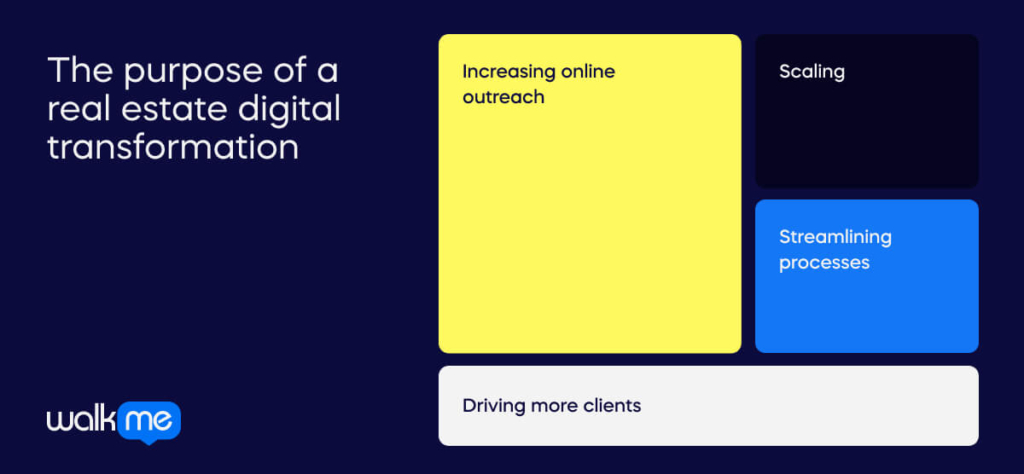
Companies increasingly leverage innovative technologies to scale their business as the real estate landscape embraces the digital revolution. This digital metamorphosis unlocks various advantages that empower businesses to thrive in the evolving market.
The purposes of digital transformation in real estate include the following:
- Increasing online outreach: Casting a wider net in the vast digital ocean fosters brand awareness, attracts diverse leads, and taps into previously inaccessible markets.
- Scaling: Digital tools automate tasks, fueling streamlined processes, which unlock exponential growth potential, rapid business expansion, and scaling markets beyond local boundaries.
- Streamlining processes: Automating repetitive tasks liberates time for client focus, boosts efficiency, and eliminates error-prone manual workflows.
- Driving more clients: Engaging buyers and sellers across the digital spectrum with targeted content, personalized interactions, and frictionless transactions fuels pipeline growth and conversions.
A transformation in your real estate enterprise minimizes your expenses by alternating between different CRM systems, leveraging digital marketing tools, and using smart contracts.
Therefore, the purpose of this transformation is to save time and money and allow staff to focus on higher-level tasks impossible to complete with machines, such as innovation and excellent customer service.
Digital transformation in real estate technologies
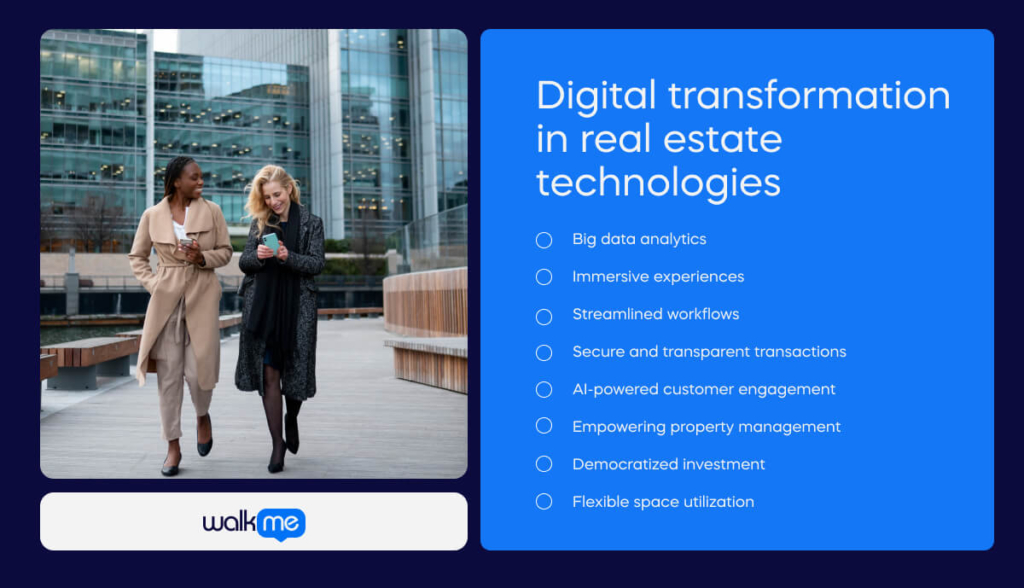
The real estate industry, once characterized by bricks and mortar, is undergoing a dynamic shift towards a digital landscape. Fueling this metamorphosis are eight key technologies, each already reshaping how we buy, sell, and manage properties. The first of these technologies is data-driven insights.
Big data analytics
Big data analytics isn’t just about crunching numbers; it’s about unearthing hidden insights that elevate your business. Imagine analyzing competitor strategies to optimize your pricing, pinpointing key demographics with laser-targeted marketing campaigns, or streamlining property management by predicting maintenance needs before they arise.
When equipped with the right tools, data becomes a goldmine, turning raw information into actionable intelligence that sets you apart in a competitive market. Optimize, target, streamline – the power of big data analytics transforms how you navigate the real estate landscape, ensuring you stay ahead of the curve and capitalize on every opportunity.
Immersive experiences
Imagine stepping into a potential home without leaving your couch. Augmented Reality (AR) and Virtual Reality (VR) solutions bridge the gap between online listings and physical experiences.
AR overlays digital elements onto real-world spaces, while VR transports clients into fully immersive tours, boosting engagement and reducing reliance on physical viewings.
The increasing popularity of AR devices like the Apple Vision Pro will likely increase interest and market value in this new technology for house buyers to experience potential buys in new and more engaging ways.
Streamlined workflows
Paper piles and scattered spreadsheets are relics of the past.
Embracing cloud-based CRMs and transaction-tracking tools like Salesforce or DocuSign transforms your daily grind into a seamless symphony. Imagine organizing mountains of paperwork with a couple of clicks, managing hundreds of client interactions effortlessly, and eliminating the endless printing, signing, and filing cycle.
Not only does this boost your productivity, but it also cultivates a clean, organized workspace that sparks creativity and inspires confidence in your clients. Ditch the paper chase and embrace the digital age – a world where efficiency reigns supreme and peace of mind becomes your new standard.
Secure and transparent transactions
Blockchain technology is the future of secure and transparent real estate transactions. It automates and encrypts every process step, from initial offers to final closings, streamlining the journey and eliminating potential errors or fraud.
This fosters an environment of trust and eliminates uncertainty, creating a win-win scenario for buyers and sellers.
Imagine closing deals faster, securing transactions with unbreakable digital locks, and leaving a trail of verifiable ownership for generations. Welcome to the age of blockchain – where security becomes the cornerstone of every deal and peace of mind replaces hesitation.
AI-powered customer engagement
Ever-evolving AI chatbots are transforming customer service. They answer questions 24/7, collect crucial client data, and personalize marketing campaigns, freeing your team to focus on high-value interactions.
Empowering property management
Ada or Kustomer can become your tireless realty assistants. These digital companions greet your clients 24/7, answer their questions with remarkable accuracy, collect invaluable data for deeper insights, and personalize marketing campaigns for maximum impact.
Free your team from the burden of repetitive tasks and allow them to focus on high-value interactions, building genuine relationships, and exceeding client expectations. With AI by your side, the human touch never goes out of style, optimizing processes and reducing stress while improving the customer experience.
Democratized investment
Real estate crowdfunding platforms open doors for smaller investors and developers. By pooling funds, individuals can participate in large-scale projects, accessing a broader market with minimal capital outlay.
AppFolio and Yardi are comprehensive solutions that automate tedious tasks, centralize communication, and streamline maintenance workflows, transforming landlords and property managers into operational powerhouses.
These apps lead to tenants, smooth building operations, and maximized returns – a trifecta of success awaits those who embrace the power of these digital tools.
Flexible space utilization
The Space-as-a-Service (SPaaS) model offers unprecedented leasing flexibility, catering to companies and individuals seeking adaptable living and storage solutions. This pay-per-use model aligns with modern demands for agile workspaces and temporary accommodations, opening up new avenues for your business.
By embracing these transformative technologies, you can confidently equip your real estate business to navigate the evolving market, unlock new opportunities, and solidify your position in the property’s future. Remember, digital transformation is not just a trend – it’s the key to thriving in the new real estate landscape.
Digital transformation in real estate examples
The best way to understand how real estate companies carry out their transformations using digital technologies is to look at a few examples. Consider the five examples below to know how different organizations successfully approach large-scale changes.
Zillow

This strategic shift rests upon five key pillars:
- Streamlined touring: Integrating virtual tours and scheduling tools to facilitate frictionless property exploration.
- Accessible financing: Providing pre-qualification options and partnerships with lenders to simplify mortgage acquisition.
- Expanded seller solutions: Offering additional services like iBuying and property management to cater to diverse seller needs.
- Robust partner network: Collaborating with industry players to broaden service offerings and reach.
- Seamless service integration: Weaving real estate-adjacent services like moving and home improvement into the platform for a comprehensive experience.
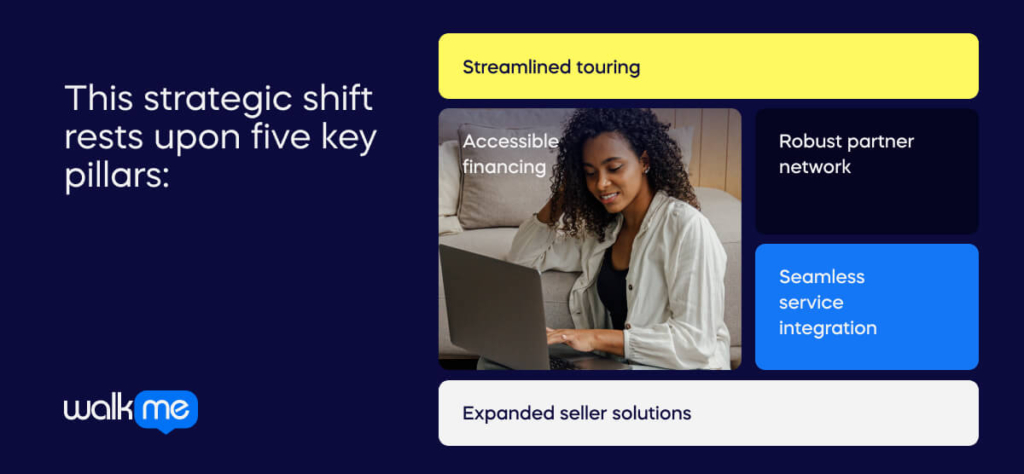
Realtor.com

Chris Patalano has this to say about the digital transformation approach of US realty company Realtor.com:
“Digital transformation is essential for Realtor.com and the real estate industry as it describes how we use technology to improve operations, enhance experiences, and drive innovation. We integrate technologies like data analytics, AI, machine learning and automation to gain insights into our customers and consumers and to deliver personalized experiences. We create robust online marketplaces and empower users with comprehensive listings and advanced features.”
Sotheby’s International Realty
TR Sotheby’s International Realty, a renowned luxury real estate brand, has consistently demonstrated its commitment to digital transformation through strategic acquisitions. Integrating key applications across various functionalities has created a robust tech stack that empowers their operations and enhances client experiences.
Notable investments which positively impact Sotheby’s International Realty include:
- Microsoft 365 (2015): Enabling seamless collaboration and communication across teams, Microsoft 365 fosters internal efficiency and productivity within the organization.
- Amazon SES (2017): Opting for Amazon’s reliable email service ensures secure and scalable delivery of transactional emails, maintaining critical communication channels with clients.
- ActivePipe (2019): This marketing automation platform streamlined campaigns and boosted customer engagement, solidifying TR Sotheby’s position as a data-driven leader. TR Sotheby’s International proactively embraces technological advancements, ensures competitive agility, fends off potential disruptions, and reinforces its position as a leader in the luxury real estate sector. Their strategic approach sets a compelling example for other businesses aiming to thrive in the ever-evolving digital landscape.
RE/MAX
To remain competitive, online realty company RE/MAX has recently made many technology acquisitions.
RE/MAX, LLC has purchased the following applications:
- Yardi Voyager (2008): Centralized landlord tool for managing tenants, leases, and finances.
- Oracle Cloud ERP (2013): Company-wide financial control center for budget, reporting, and data insights.
- Yardi Genesis (2016): Mobile management companion for property info, tenant communication, and maintenance.
With an impressive revenue surge to $282.0 million in 2023, RE/MAX, LLC is already seeing the benefits of its technological investments. Building on these successes, the global real estate franchisor may invest strategically in a spectrum of disruptive technologies such as AI, machine learning, IoT, blockchain, autonomous database, or cloud-based ERP.
Trulia
Trulia, a leading online real estate marketplace, is making significant strides in leveraging cutting-edge technologies to enhance customer experience. At the forefront of this effort is Varun Varma, Trulia’s Chief Data Officer, who envisions “providing unique insights to consumers at their fingertips.”
Trulia is harnessing the power of Artificial Intelligence (AI) and computer vision to achieve this ambitious goal.
Varma has significantly bolstered Trulia’s extensive data infrastructure to support this transformative vision. Under his leadership, a team of over 70 data engineers, scientists, software engineers, and DevOps experts has implemented a robust tech stack, including the following technologies:
- Real-time processing: Apache Kafka and Spark, along with microbatching techniques, enable seamless, continuous data analysis.
- Enhanced performance: Transitioning from Python to Cython improves coding efficiency and performance through C extensions.
- Advanced analytics: Implementing SQL search engine Presto empowers deeper data analysis and insights.
What are the 6 aspects of digital transformation in real estate?
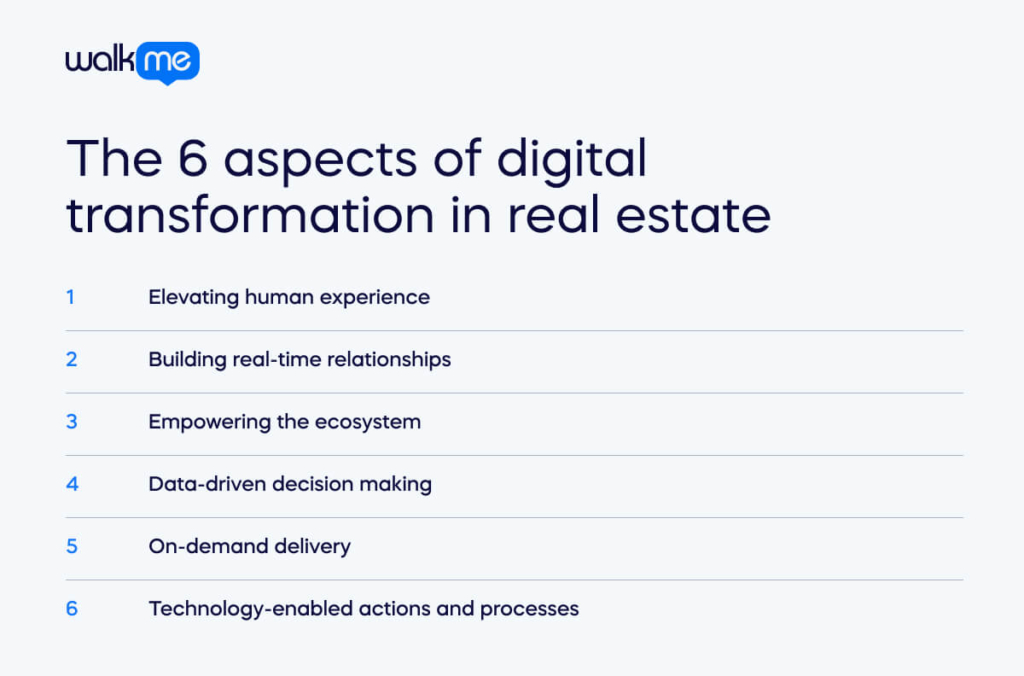
Frustrations and complexities have long marred the journey of buying or renting a home. Technology helps customers overcome these frustrations by streamlining the process via six aspects of digital transformation in real estate. The first of these seeks to optimize the human experience.
1. Elevating human experience
Yaza, a real estate app for video home tours, exemplifies this shift. Their pandemic-era launch of 3D virtual tours allowed agents to record once and share with potential buyers effortlessly, a testament to adapting to social changes and enhancing human interaction.
2. Building real-time relationships
Digital technologies allow won’t build trust because, in real estate’s digital leap, forging authentic relationships remains an anchor. Clients yearn for beyond-screen connections, humanized tech, and empathy-driven interactions. Cultivate partnerships with care, and your investment in digital transformation will evolve beyond a mere journey; it will become a shared homecoming.
3. Empowering the ecosystem
Digital transformation extends beyond homebuyers, benefiting the entire ecosystem. Online contract generators eliminate unnecessary in-person meetings, single-inbox solutions like Intercom & Paperless Pipeline reduce stress, and cloud-based property management systems streamline operations.
This consideration increases efficiency and empowers employees, offering flexible work arrangements like part-time roles or freelance opportunities to improve employee experience.
4. Data-driven decision making
Intuition or algorithms may guide your decision, and big data fuels the latter. Beyond traditional factors like location and price, real-time data offers insights into crime rates, future infrastructure projects, and environmental risks in specific areas. Doing so empowers buyers and investors to make more informed, data-driven decisions.
5. On-demand delivery
Millennials and Gen Z crave access to temporary services, and the space-as-a-service model caters to this need. Parking platform Parkaze exemplifies this, allowing owners to rent out unused parking spaces while drivers access on-demand, affordable, convenient parking options.
6. Technology-enabled actions and processes
From VR home tours to cloud-based software, intelligent contracts, and big data algorithms, digital real estate prioritizes technology-driven actions and processes. This action translates to a seamless, tech-savvy experience throughout the journey, from initial searches to post-purchase interactions.
In essence, digital transformation is not just about adopting new technologies; it’s about reimagining how we interact with real estate. By prioritizing elevated human experiences, real-time connections, and data-driven insights, we can transform a traditionally cumbersome process into a smooth, streamlined journey for all participants.
How do you digitize real estate?
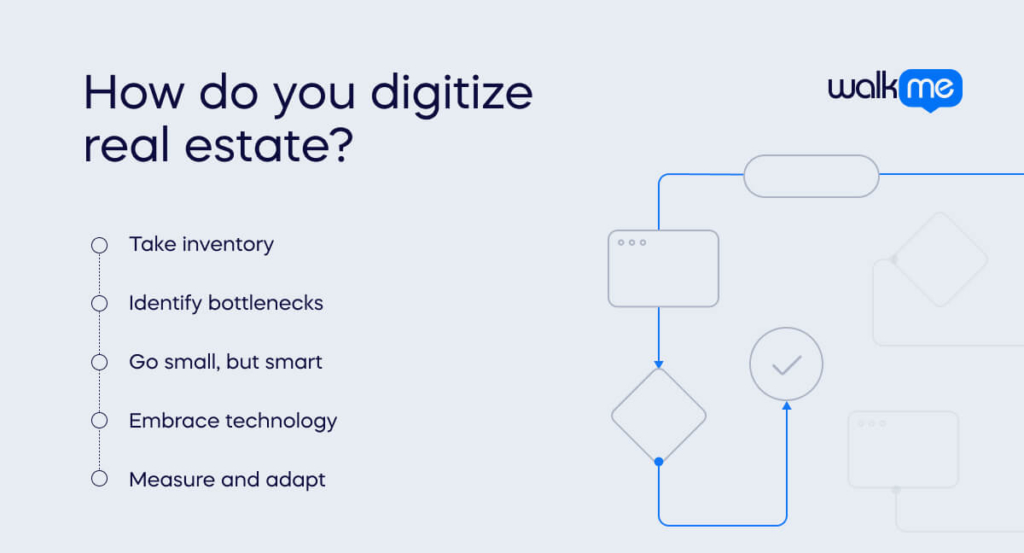
It is essential to consider the steps you need to achieve digitization for your real estate enterprise. The first of these steps is to take a step back and record your inventory, as doing so gives you a benchmark for what you are currently doing and how to improve your processes.
Step 1: Take inventory
Get a bird’s-eye view of all your processes, from front-facing activities like advertising and listings to back-office functions like accounting and project management. Include everything, even outdated manual tasks. Involve your staff in this audit—their on-the-ground insights are invaluable.
Step 2: Identify bottlenecks
Pinpoint the processes causing the most stress and inefficiency. Are you bogged down by clunky spreadsheets or archaic document workflows? These time-consuming hassles drain resources and frustrate clients. Prioritize pain points with high cost or morale impact.
Step 3: Go small, but smart
Don’t attempt a digital overhaul overnight. Start with one or two critical processes using the “Minimum Viable Product” (MVP) approach. Develop a functional, basic solution, then gather user feedback to refine it continuously. This iterative approach is far more efficient than building a perfect solution in a vacuum.
Step 4: Embrace technology
Invest in tools designed for the real estate industry. CRM platforms streamline client management, cloud-based solutions centralize data, and e-signature tools like Docusign expedite transactions. Don’t reinvent the wheel – leverage existing tech to overcome your hurdles.
Step 5: Measure and adapt
Track the impact of your digital initiatives. Are deals closing faster? Are clients happier? Are you attracting top talent? Use data to gauge your progress and refine your strategy.
Remember, digital transformation is a journey, not a destination. By starting small, prioritizing pain points, and embracing flexible solutions, you can empower your real estate firm to flourish in the digital age.
Focus on staff to achieve digital transformation in real estate success
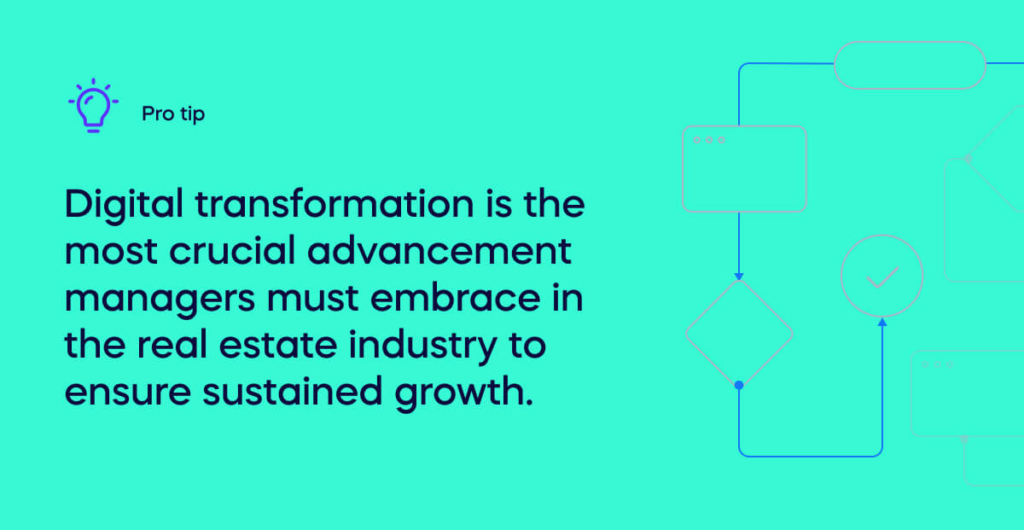
Digital transformation is the most crucial advancement managers must embrace in the real estate industry to ensure sustained growth.
Investing in digital tools and solutions is paramount, as it revolutionizes how houses are bought and sold, offering customers the most relevant and streamlined experience.
However, it’s vital to recognize that the true key to success lies in technology and the people driving the industry forward. When acquiring new technologies, managers should also prioritize comprehensive learning opportunities for employees and provide robust change management support to ensure employee retention.
Real estate businesses can rapidly scale their operations by emphasizing staff training and development. Employees who comprehend the value and significance of digital transformation contribute to creating a culture of agility, enabling the swift adoption of new technologies that drive innovation.
This strategic approach grows your organization’s size and establishes a foundation for continuous expansion within the vibrant world of modern real estate.


